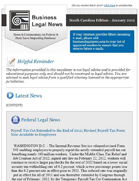


If asked, most South Carolina business owners will likely tell you that they have worked too hard in building a business to potentially risk losing all they have created to a plaintiff in some dubious law suit. For better or worse, the risks and costs of litigation have simply become a cost of doing business. Indeed, federal government statistics show that a company is more likely to be sued by an  employee than by a third-party. While asset risk management should never directly intend to shortchange either known or legitimate creditors, business activities can sometimes be legitimately structured in advance to maximize protections under the law. There are two kinds of asset risk management that every business owner will want to be aware of: (1) personal asset risk management and (2) business asset risk management. However, asset risk management is generally not a substitute for insurance, nor will it, or should it, make the business owner “bullet proof” in every instance. There are both advantages, as well as limitations to what asset risk management planning can do. But business owners that avail themselves of such protections may be more likely to minimize risks and therefore legitimately manage and protect more of what they have created and earned than those who remain happily oblivious to such issues, until it is too late. One possible protection is found in limiting the entities and assets involved in any transaction and making such limits clear within the bounds of the law.
employee than by a third-party. While asset risk management should never directly intend to shortchange either known or legitimate creditors, business activities can sometimes be legitimately structured in advance to maximize protections under the law. There are two kinds of asset risk management that every business owner will want to be aware of: (1) personal asset risk management and (2) business asset risk management. However, asset risk management is generally not a substitute for insurance, nor will it, or should it, make the business owner “bullet proof” in every instance. There are both advantages, as well as limitations to what asset risk management planning can do. But business owners that avail themselves of such protections may be more likely to minimize risks and therefore legitimately manage and protect more of what they have created and earned than those who remain happily oblivious to such issues, until it is too late. One possible protection is found in limiting the entities and assets involved in any transaction and making such limits clear within the bounds of the law.
Every business should be able to able to answer the following question. Please click the question to view the comment.
1. Are you aware of the exceptions to personal asset protection for shareholders of corporations or members of limited liability companies who provide personal services to the business itself? back to top
Beware that exceptions to the personal asset protections generally afforded shareholders in a corporation, or members in a limited liability company, exist. Business owners often form a corporation or limited liability company hoping to protect their personal assets from such risks. Forming either type of business entity may help, but too often business owners are unaware that many exceptions to limited liability protection exist where personal asset protection is concerned. Under certain circumstances, the “veil” of limited liability protection afforded to corporate stockholders or limited liability company members can be “pierced.” Given the casual management style of most small and developing businesses, this threat is especially real. Moreover, forming a corporation or limited liability company never protects an individual against the legal consequences of his or her own acts of negligence or omissions, regardless of whether done when carrying out business activities or not. When an exception to limited liability protection applies, personal liability will be imposed.
2. Has the company taken measures to protect its business assets from claims against the owners? back to top
While many businesses owners take measures to protect their personal assets while carrying out their business activities, most fail to protect their business assets from claims against themselves or the other owners of the business personally. Claims by lien or judgment holders brought against any of the business owners personally can under certain circumstances result in the transfer of ownership in the business and the liquidation of the business for the purpose of selling-off the assets to satisfy the claim of lien or judgment.
Comprehensive asset risk management, however, can reduce these risks. This is true, even if the business is ongoing. But, to be effective, the planning usually must be done for good business reasons and before problems arise, otherwise any transfer of assets required to start the plan might be, at best, ineffective by law, or at worst, fraudulent. Thus, the best time to begin to think about asset risk management is when you think you need it the least.
Whether a business is ongoing or newly starting, risk management should be an integral part of its game plan. Most large businesses understand this – the ability to minimize their exposure to the claims and law suits of others, indeed their very survival, depends on maximizing their use of protections afforded them by right of law. For big businesses, asset protection is simply a part of doing business. Small businesses, however, often believe that they are at a distinct disadvantage in this regard. But this belief is more mistaken perception than reality. The laws that protect “big business” are almost always available to businesses of any size (and their owners) with assets valuable enough to protect.
3. If your business has assets with substantial value, has an asset risk management strategy been considered or put into place? back to top
Where business risk management is at issue, a dilemma arises, regardless of whether a corporation or limited liability company has been formed. The crux of this dilemma is found in the fact that protecting business assets against business creditors and personal assets against personal creditors are often competing interests.
One commonly used risk management strategy to achieve the mutual protection of business and personal assets involves the use of a holding company. The function of a holding company is to own (“hold”) assets in a business entity that is legally separate from, and therefore not subject to the law suits of, the primary business and its operations. For, in most instances, it is the operations of the active business itself that subject it to suit. At the same time, assets placed in a holding company, not being personal assets, enjoy some degree of protection against the personal creditors of the business owner.
Limited liability companies are typically the business entity of choice for holding companies
Get answers now to your important legal questions and concerns.

IMPORTANT DISCLAIMER: This checklist (in whole or part) is not an exhaustive list of legal issues applicable to any business. Its purpose is strictly educational. It is not intended to be construed as legal advice, or a substitute for legal advice, and should not be relied on without consulting a licensed attorney competent in business matters. The federal, state, and local laws and regulations on which this information was originally created are subject to change without notice. No warranty, whether express or implied, is made as to the frequency or timeliness of any corrections or updates to the information provided herein.
Copyright © 2009- Small Business Law Firm, LLC. All Rights Reserved. This document is protected by U.S. and International Copyright Laws. You agree that use of these materials are restricted to authorized users (current and prospective clients only) and shall not be used for other commercial purposes without the express written permission of the Small Business Law Firm, LLC.
By using this website, you agree to read the important legal notices and disclaimers and be bound by the terms and conditions set forth in the Legal Disclaimer section and other sections of this website. Should a dispute arise with regard to your use of the contect of this website, you expressly agree to be subject to the the jurisdiction of the State of South Carolina
Small Business Law Firm, LLC
Serving South Carolina: Columbia(main office), Charleston, Greenville(satellite office appointments by prior agreement & by virtual services), other SC Locations (virtual services only)

Follow us